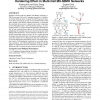Free Online Productivity Tools
i2Speak
i2Symbol
i2OCR
iTex2Img
iWeb2Print
iWeb2Shot
i2Type
iPdf2Split
iPdf2Merge
i2Bopomofo
i2Arabic
i2Style
i2Image
i2PDF
iLatex2Rtf
Sci2ools
MOBIHOC
2015
ACM
2015
ACM
Cross-Cell DoF Distribution: Combating Channel Hardening Effect in Multi-Cell MU-MIMO Networks
Equipped with the multi-user MIMO (MU-MIMO) technology, a WiFi access point (AP) with M antennas can achieve M degreesof-freedom (DoF) in theory. Existing MU-MIMO protocols strive to maximize DoF usage by serving M users simultaneously. In this paper, through a MU-MIMO testbed measurement, we found that the correlation between users’ channels can severely compromise network throughput under a DoF-maximizing strategy. To combat this problem, we propose Kardia that judiciously distributes the DoF to least-correlated users within an AP’s cell, and coordinates neighboring APs such that each can serve the best set of users while nulling mutual interference. The key challenge in Kardia lies in efficiently determining which set of users to serve without knowing the channel state from all of them. We propose a lightweight mechanism that enables APs to collaboratively infer the correlation between users through precoded probing packets. Our analysis shows that Kardia’s DoF distribution ...
| Added | 14 Apr 2016 |
| Updated | 14 Apr 2016 |
| Type | Journal |
| Year | 2015 |
| Where | MOBIHOC |
| Authors | Xiufeng Xie, Xinyu Zhang, Eugene Chai |
Comments (0)

